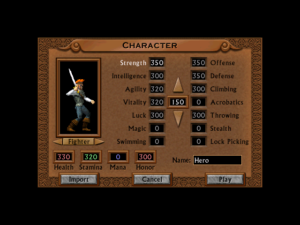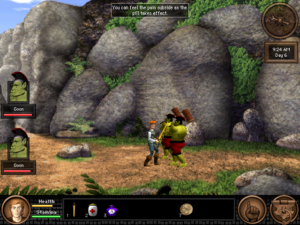QfG5: Score
One of my oldest and dearest memories of concerted completism is getting a complete score with all three character classes in Quest for Glory I (or Hero’s Quest, as it was called at the time). The maximum score was 500 points, and through careful note-taking, I noticed that 450 of those points could be earned by any class. 50 being a nice round number, I reasoned that the last few points had to be earned through class-specific actions. Anyone could beat up a goblin, but only the fighter earned points by doing so. In addition, I noticed that for two of the classes, I had earned a large portion of the 50 class-specific points by besting a master of that class at some challenge, and realized that the third should be looking out for a similar challenge.
Quest for Glory 5 aids such analysis by tracking your “deeds”, a list of everything you’ve done that earned points. In other words, it’s like the “fullscore” command in Inform games, except that it doesn’t say how many points things earned. (And in some cases I can’t tell even from observing how much my score went up; sometimes two deeds happen together.) Anyway, it’s always nice to see graphic adventures catching up to features that are commonplace in text games. The deeds list is a little sloppily put-together, with some things recorded incorrectly — monsters have different names and the like. Well, scoring is usually an afterthought in adventures. This list is pretty definitely more important to me than it was to the game’s designers.
The games in the series have certain common practices in scoring. Wherever in the world you are, there’s always a few points to be earned by signing the logbook in the Adventurer’s Guild. Getting an item that’s necessary for solving a non-optional puzzle always gives you points, which is handy for winnowing out the really important stuff in shops. If you play as a fighter — which I still am, despite starting over and thus having a clear opportunity to pick a new class — you get a few points for each distinct type of monster you slay — gotta kill ’em all! And that last part is affecting how I’m playing this game in a way that the authors didn’t intend.
This relates to what I was saying before about timing. I’ve done some experiments by staying in my room and sleeping for weeks at a time 1In the game, I mean., and it looks like I was right: there are no negative consequences for starting the Rites of Rulership later. Since I know there are negative consequences for not being able to complete the tests quickly enough, I want to get as much of the game done as I can before I start the clock ticking. Obviously this includes getting the Fighter’s class-specific points for big game hunting. Some of the monsters are tough, but no match for my ability to pop healing pills during battle. (The world will be doomed once the monsters figure out that trick). Some are rare and hard to find. All would be easier to kill if I had access to the magical weapons that you can only buy after you enter the Rites. But I think I’ve klled everything that’s available to be killed before the Rites open up new areas. And I really wasn’t supposed to.
I think of my experiences with QfG1. There was no compulsion on the player to complete events within a certain timeframe, so I basically just tried to kill things as I encountered them over the course of traipsing around and trying to solve puzzles. It was an unstructured melange of puzzles and combat. Whereas QfG5 gave me just enough motivation to segregate the two realms. Part of the strength of QfG1 was the way that the two aspects of the game complemented each other — that you could go grinding when you were stuck on puzzles, and puzzling when you were tired of grinding. In some cases, if you couldn’t solve a puzzle the clever way, you could exercise your stats to the point where you could overwhelm it. But I’m going to miss all that in this playthrough. I’ll just have to save the clever stuff for when I play as a Thief.
| ↑1 | In the game, I mean. |
|---|
 Comments(0)
Comments(0)

